
Tech: A Comprehensive Overview of Modern Technology
Tech: A Comprehensive Overview of Modern Technology
In today’s fast-paced world, technology—commonly referred to as “tech”—is a driving force behind societal evolution and economic progress. From artificial intelligence (AI) to quantum computing, the scope of tech encompasses innovations that redefine industries, improve lives, and transform global communication. This essay explores the concept of technology, its development, key trends, applications, and its potential future, encapsulating how tech shapes and reflects the needs and aspirations of humanity.
The word “tech” has become synonymous with innovation, progress, and modernity. Technology is the backbone of today’s world, touching every aspect of life—from how we communicate to how we work, learn, and even entertain ourselves.
The Essence of Technology
Technology refers to the application of scientific knowledge for practical purposes, enabling the development of tools, systems, and methodologies to solve problems and fulfill human needs. Historically, technology has been pivotal in shaping civilizations—from the invention of the wheel to the emergence of the internet. Modern technology extends beyond physical tools to include software, digital platforms, and networks that enhance efficiency and connectivity.
Historical Perspective
The journey of technology is a testament to human ingenuity. Early humans used basic tools like stone axes and fire, which marked the beginning of the Stone Age. Over millennia, advancements in metallurgy, transportation, and agriculture ushered in transformative eras such as the Industrial Revolution. In the 20th century, the digital age emerged with the advent of computing and the internet, setting the stage for exponential progress in the 21st century.
Key Trends in Modern Technology
Several revolutionary trends dominate the contemporary tech landscape, each influencing multiple sectors:
1. Artificial Intelligence and Machine Learning (AI/ML)
AI simulates human intelligence through machines capable of learning, reasoning, and decision-making. Machine learning, a subset of AI, uses algorithms to analyze data, identify patterns, and make predictions. Applications include:
– Healthcare: AI-powered diagnostics and personalized medicine.
– Finance: Fraud detection and algorithmic trading.
– Retail: Personalized shopping experiences.
2. Internet of Things (IoT)
IoT connects physical devices via the internet, enabling data exchange and automation. Smart homes, wearable health devices, and connected vehicles are prominent examples, enhancing convenience, efficiency, and real-time monitoring.
3. Blockchain Technology
Initially developed for cryptocurrencies like Bitcoin, blockchain ensures secure, transparent, and decentralized record-keeping. Its applications extend to supply chain management, voting systems, and smart contracts.
4. Quantum Computing
Quantum computing leverages quantum mechanics to perform computations at unprecedented speeds. Although in its infancy, this technology has the potential to revolutionize fields like cryptography, material science, and artificial intelligence.
5. 5G Connectivity
The fifth-generation (5G) wireless network delivers faster data speeds, reduced latency, and improved connectivity, fueling advancements in IoT, augmented reality (AR), and smart cities.
6. Sustainable Technologies
As the world grapples with climate change, tech innovations focus on sustainability. Renewable energy sources, energy-efficient devices, and green architecture contribute to reducing environmental impact.
Attention:This essay delves into the expansive world of tech, covering its evolution, impact, applications, challenges, and the exciting future it promises.
Applications of Technology
Tech permeates every aspect of life, driving innovation and improving functionality across various sectors:
1. Healthcare
Technology revolutionizes healthcare by improving diagnostics, treatment, and patient care:
– Telemedicine: Enables remote consultations and monitoring.
– Wearable Devices: Track vital signs for early detection of health issues.
– Biotechnology: Enhances drug development and genetic research.
2. Education
E-learning platforms, virtual classrooms, and AI-powered personalized learning tools make education accessible and adaptable, bridging gaps in traditional systems.
3. Communication
From emails to instant messaging, technology has revolutionized communication, enabling global connectivity through platforms like WhatsApp, Zoom, and social media.
4. Business and Finance
Tech streamlines operations, boosts productivity, and facilitates financial transactions through automation, e-commerce, and digital payment systems.
5. Entertainment
The entertainment industry thrives on technological innovations such as streaming platforms, virtual reality (VR) gaming, and advanced graphics in filmmaking.
6. Agriculture
Smart farming techniques use IoT, AI, and drones to optimize crop yield, monitor soil health, and ensure efficient resource utilization.
7. Transportation
Electric vehicles (EVs), autonomous driving, and smart traffic management systems are reshaping urban mobility and reducing carbon footprints.
—
Challenges in Technology
Despite its benefits, tech also poses challenges, such as:
– Data Privacy: Increasing reliance on digital platforms raises concerns about data security and user privacy.
– Digital Divide: Unequal access to technology exacerbates social and economic inequalities.
– Job Displacement: Automation threatens traditional jobs, necessitating reskilling.
– Ethical Dilemmas: AI decision-making and genetic editing spark ethical debates.
—
The Future of Technology
The future of technology promises exciting breakthroughs and transformative solutions. Anticipated developments include:
– AI Evolution: Enhanced AI systems with greater cognitive abilities.
– Space Exploration: Advanced spacecraft for interplanetary exploration.
– Biotechnology: Innovations in regenerative medicine and gene therapy.
– Clean Energy: Expanded adoption of renewable sources like solar and wind energy.
Technological advancements will also emphasize inclusivity, ensuring equitable access and addressing global challenges such as climate change, poverty, and disease.
Conclusion
Technology is a cornerstone of modern society, reflecting human creativity and the quest for improvement. Its evolution continues to redefine possibilities, empowering individuals and communities to overcome challenges and achieve aspirations. By embracing innovation responsibly, society can harness tech’s potential to create a sustainable, connected, and prosperous future.
Leave Your Comment